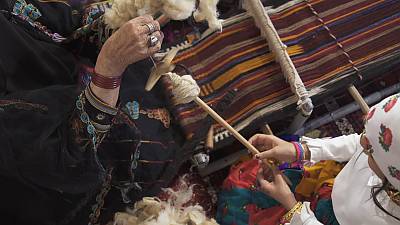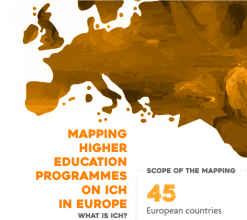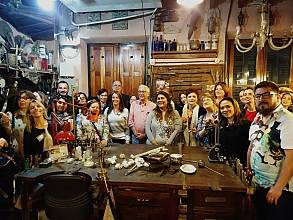
© Saudi Heritage Preservation Society (SHPS), 2018
Tertiary education institutions play an important role in training future decision-makers, planners and administrators to work in the field of safeguarding living heritage and can be key actors in capacity-building. In order to find out how and to what extent living heritage is present in tertiary education programmes around the world, UNESCO has undertaken a series of regional surveys.
The surveys, undertaken between 2016 and 2020, have shown that very few training programmes are specifically focused on living heritage safeguarding, and that teaching about intangible cultural heritage is highly dispersed throughout different disciplines (heritage studies, anthropology, environmental studies, etc). Survey exercises were intertwined with and supported by newly established tertiary education networks focusing on ICH, which have a key role to play in deepening the reflection of ICH in the academic world.
Through networking, universities and other post-secondary education institutions can exchange on different approaches to enrich their own programmes and better understand how to integrate intangible cultural heritage effectively. In this context, the Global Capacity-building Programme within the 2003 Convention is putting a focus on tertiary education networking.
Below you can learn more about the regional surveys, the existing regional networks and activities linked to intangible cultural heritage and tertiary education.
Africa
Regional network: Southern African Intangible Cultural Heritage Platform (SAICH)
URL: http://saich.org/home/
- The Southern African Intangible Cultural Heritage Cooperation Platform (SAICH) was initiated in 2015 with support from the Government of Flanders and hosted by Chinhoyi University of Technology (CUT) in Zimbabwe. Since its creation, the network has supported the implementation of different phases of an ICH safeguarding regional project (2013-2015, 2016-2017 and 2018-2019). The network has published, in 2016 and in 2019, two issues of a newsletter highlighting its major activities. In 2019, the network published a report on Women and Intangible Cultural Heritage in Southern Africa.
- The UNESCO Regional Office for Southern Africa led a survey on intangible cultural heritage in Southern Africa in 2018 (SAU-ICH survey). It had a very high response rate and highlighted the existence of a diversity of programmes related to intangible cultural heritage in the region. In 2019, only one university programme was solely focused on ICH (Zambia), though multiple research initiatives led by institutions in Southern Africa were related to ICH domains.

© SAICH Platform
- In East Africa, a preliminary survey was undertaken in 2018. It highlighted that most tertiary education programmes related to heritage remained focused on tangible cultural heritage, but that some university departments offered programmes in academic disciplines such as anthropology, sociology, archaeology, languages and literature and visual and performing arts emphasizing local culture and living heritage.
- In Uganda, the Cross-Cultural Foundation of Uganda carried out a national survey on ICH and tertiary education in 2018. It found that cultural studies in general and ICH in particular are offered in some courses by Ugandan universities, and that few courses focus on transmitting and promoting practical ICH knowledge and skills. It also highlighted that some universities have shown a growing interest on the importance of culture in development in recent years.
Arab States
- In 2020, in the midst of the COVID-19 pandemic, a regional survey was conducted in the Arab region. It highlighted an increasing number of university trainings in the field of cultural heritage in recent years, and the existing links between tertiary education and ongoing programmes carried out by cultural institutions. It also underlined the lack of tertiary education trainings exclusively dedicated to ICH, even if courses on heritage, traditional culture and folklore courses exist in a variety of university departments. The survey recommended the setting of a regional network dedicated to intangible cultural heritage in tertiary education.
Asia and the Pacific
Regional network: Asia-Pacific Higher Education Network for Safeguarding Intangible Cultural Heritage (APHEN-ICH)
URL: https://www.unesco-ichcap.org/
- The Asia-Pacific Higher Education Network for Safeguarding Intangible Cultural Heritage (APHEN-ICH) was founded in 2018 with support from UNESCO and the International Information and Networking Centre for Intangible Cultural Heritage in the Asia-Pacific Region under the auspices of UNESCO. It was created after the first Regional Symposium on the Development of Post-Graduate Degrees Focusing on ICH held in 2015, which brought together 16 universities in 11 countries from the region. Since its creation, APHEN-ICH has continued to strengthen its network through a series of international seminars and a field school.
- In 2017, the UNESCO Office in Bangkok and ICHCAP carried out a survey on the activities and needs of tertiary education actors in Asia and the Pacific. Its results were presented in December, 2017 at a roundtable side event to the 12th session of the Intergovernmental Committee. The survey highlighted an increase in post-graduate heritage programmes in the region in the previous decade - a third of them were less than 5 years old. They were found to have a limited focus on living heritage, even if it was integrated as a component of university courses in different fields. The lack of financial resources and technical support to establish or strengthen ICH programmes was also highlighted in the survey.

© UNESCO/ICHCAP
- The First Meeting of the Asia-Pacific Higher Education Network for Safeguarding ICH was held in the Republic of Korea in July 2018. It was preceeded by an international forum on ‘Unlocking the potential of tertiary education for ICH safeguarding’ co-organized by the UNESCO Office in Bangkok and ICHCAP. The meeting brought together universities around the region interested in developing and strengthening ICH-related tertiary education programmes to discuss future collaborations. The second and third meetings of the network were held in 2021 and 2022 respectively. During the last one, a new Secretariat for the 2022-2024 period was appointed.
Europe and North America
Regional networks: European Network on Cultural Management and Policy (ENCATC)
URL: https://www.encatc.org/
European Network of Focal Points for the 2003 Convention (ENFP)
Regional Network of Experts on Intangible Heritage in South-East Europe

© Mirentxu Gabikagogeaskoa
- The European Network on Cultural Management and Policy (ENCATC) aims at advocating and promoting cultural management and cultural policy education, professionalizing the cultural sector to make it sustainable, and creating a platform for discussion and exchange at European and international levels.
- In 2017-2018, ENCATC completed a survey to analyze ICH-related programmes currenty offered by tertiary education institutions in Europe within the framework of the project ‘Learning on intangible heritage: building teacher’s capacity for a sustainable future’. The survey provided a first mapping of institutions and on-going programmes. It found that 146 university programmes contain subjects on ICH and 36 focus specifically on ICH, most of them at the master’s level.
- In April 2021, the European Network of Focal Points for the 2003 Convention (ENFP) was launched for the UNESCO Group I and II countries. On the same year, the network’s first online meeting took place to present and exchange on its mission and vision.
Latin America and the Caribbean
Regional network: Academic Cooperation Network on Intangible Cultural Heritage in Latin America and the Caribbean (ReCA PCI LAC)
URL: https://recapcilac.irice-conicet.gov.ar/

© UNESCO
- The Academic Cooperation Network on Intangible Cultural Heritage in Latin America and the Caribbean (ReCA PCI LAC) was established through an agreement resulting from a regional meeting led in 2017 by the UNESCO Montevideo and Havana Offices and the Latin American Faculty of Social Sciences (FLACSO- Argentina) in cooperation with the International Institute for Higher Education in Latin America (IESALC) and the Regional Centre for the Safeguarding of the Intangible Cultural Heritage of Latin America (CRESPIAL). The network aims at strengthening capacities for the safeguarding of ICH with a focus on the inclusion of living heritage in higher education agendas. It also promotes the production and circulation of open access materials on the safeguarding of ICH.
- In 2016, a survey carried out in Latin America and the Caribbean sought to obtain data related to ICH and tertiary education in the region. It revealed the existence of several university training courses that address ICH, both at the university level and within other public and private institutions. ICH was, however, generally considered as part of larger training programmes in the field of heritage studies or cultural management. Two specific training courses on ICH were identified in the region.
See also:
- UNESCO Category 2 centres in the field of ICH
- UNESCO Chairs and UNITWIN Networks
- UNESCO Clearinghouse on living heritage and education
- Training materials to support the global capacity-building programme
- Global network of facilitators of the 2003 Convention
- The 2003 Convention Research Bibliography
UNESCO plans to continue to build on this work. For further information, please contact ICH-capacity@unesco.org